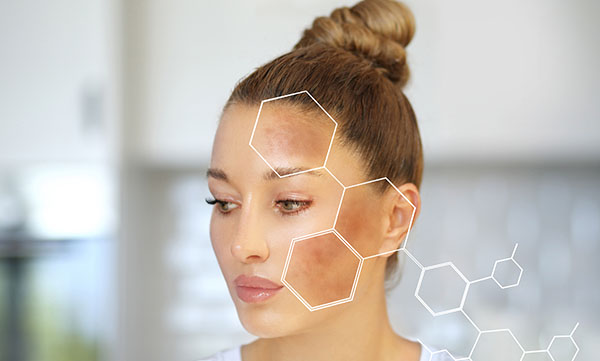Melasma
Melasma is a commonly acquired benign (harmless) skin condition. It appears as blotchy, grey, brown, or black facial hyperpigmentation (darkening). Melasma most often occurs on the forehead, chin, cheeks, upper lip, and nose. When melasma occurs during pregnancy it is termed chloasma.
Melasma can be a challenging skin condition that lasts for years and is chronic in nature. The providers and skin care experts at Skin and Laser Dermatology Center have years of experience at treating melasma in skins of all colors. Let us know how we can help you by calling today to schedule an appointment.
Frequently Asked Questions
- Melasma is more common in women than men and the typical age of onset is between 20 and 40 years old.
- Melasma is most common in skin types that tan easily or in skin that is naturally brown or black, such as individuals of Latin/Hispanic, African, Africa-America, East or South Asian, Middle Eastern or Mediterranean descent (Fitzpatrick skin types III, IV, V). It is less common in fair skin (Fitzpatrick skin types I, II) but can still occur.
- People who have a blood relative with melasma are more likely to get it themselves.
- Melasma is sometimes referred to as the “mask of pregnancy” because hormonal changes during pregnancy can trigger it.
What causes melasma is not exactly clear. It likely occurs when pigment-producing cells in the skin, called melanocytes, become overly stimulated and thereby produce and store more dark color (pigment), called melanin. Melasma can be caused by a number of factors but two of the most common are hormones, including hormonal medications, and sun exposure:
- Hormone concentration changes can cause melasma, which is why melasma may occur during pregnancy. Hormonal medications, including some birth controls or hormone replacement therapy, can also cause melasma.
- Sun exposure may cause or exacerbate underlying factors that cause melasma. Melasma can also be worsened by heat and visible light, so even sunscreen may not totally prevent melasma. Preexisting melasma can darken in the summer as warm weather and sunlight affect it.
Other causes behind melasma include genetics, reactions to certain medications, hypothyroidism, and certain skin care products.
Melasma usually occurs in sun-exposed areas. Melasma most commonly occurs on the face but it can also affect the arms, neck, and back.
Melasma is not cancerous, a sign of cancer, or a condition that can become cancerous. It is important to have hyperpigmented (darkened) skin medically evaluated however, in order to determine if it is melasma. This skin condition is benign (harmless), but it can make people feel self-conscious. If this is the case, the experts in skin care at Skin and laser Dermatology Center have many ways to improve the texture and appearance of melasma.
First, a medical evaluation of darkened skin is needed to confirm a diagnosis of
melasma, as hyperpigmentation can be due to a number of conditions. If the condition is melasma, it is possible it will fade on its own. Melasma that resolves by itself is usually due to a specific trigger, such as pregnancy or stopping birth control pills. In many cases however, melasma is chronic and can last for years. If that is the case, there are a number of treatment options offered by the skin care solution experts at Skin and Laser Dermatology Center, such as:
- ABMD Brightening Cream (pls hyperlink to this page) is specially compounded here in the office and is dermatologically tested to reduce the appearance of dark areas.
- Hydroquinone is a common treatment for melasma that comes as a cream, lotion, gel, or liquid. There are some strengths of hydroquinone that are available over-the-counter, but higher strengths will require a prescription.
- Chemical peels (pls hyperlink to this page) and Melanage Ultra Peels are excellent treatments for rejuvenating the skin and reducing hyperpigmentation by promoting cell turnover.
Certain Laser treatments can be effective for improving the appearance of melasma. There are a number of different lasers that may be recommended depending on the pigmented area and unique factors relating to each patient. Some of the lasers commonly recommended at Skin and Laser Dermatology Center for melasma are Picoway lasers (pls hyperlink to these pages).
Our Providers
Dedicated Team
Skin & Laser Dermatology Center treats patients for all skin care concerns, including skin cancer surgery, cosmetic dermatology, sclerotherapy, laser peels, laser hair removal, hyperhidrosis, rosacea, and acne treatments.







